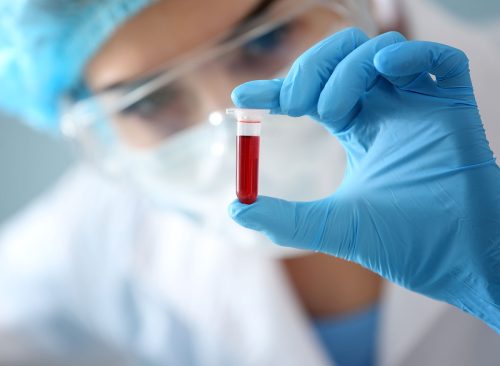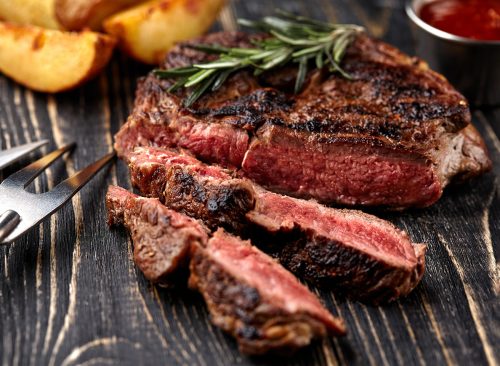Beware the “Lone Star” Tick: A Single Bite Triggers Unprecedented Meat Allergy in Man
Alpha-gal syndrome cases are on the rise. Here's what to know.

One New Jersey man has been forced to completely alter his diet after a lone star tick bite left him allergic to meat. As a result, he’s unable to tolerate steak, pork, lamb or even dairy products without suffering a serious reaction. Craig Smith, 62, suffers from alpha-gal syndrome (AGS), “a serious, potentially life-threatening allergic reaction,” according to the Centers for Disease Control and Prevention.
“AGS symptoms occur after people eat red meat or are exposed to other products containing alpha-gal. AGS can have life-changing effects.” Once a rare incident, cases of AGS are rising. “We are seeing more ticks than ever,” Alvaro Toledo, a tick expert at Rutgers University, told NJ.com. “And we are seeing ticks in areas where we didn’t see them before.” Here’s what to know.

In the spring of last year, Smith woke up with painful rashes that were the size of dinner plates and hot to the touch. They covered his body, and that’s when his health scare began. “You’re itching all over,” he told NJ.com.“You’re like: What the heck is going on?”

Worried about the situation, Smith went to doctors and allergists, who were unable to determine what caused the breakout. He has been prescribed steroids, which offered short-term relief, but the rashes returned as soon as the regimen ended. “As soon as the steroids ran out — boom,” said Smith, who, along with his wife Liz, 66, spent the next few months searching for answers.

After months of not knowing what was causing Smith to fall ill, he remembered something. “I was in the woods for a month and a half straight, getting firewood and taking a giant tree down,” he told the outlet. He also recalled a conversation with a neighbor about a mysterious illness he developed where he couldn’t eat meat.

Smith put all the information together and went back to the doctors. It was the first time he heard of alpha-gal syndrome. “I saw this thing about (ticks) and thought about him and looked it up,” Smith said. “And there was the first symptom, the most prevalent symptom of the whole thing, was hives.” He returned to doctors, who ordered a blood test confirming AGS.

After the diagnosis, Smith had to cut out red meat and dairy, but can still consume chicken, fish, and turkey. “It just flipped everything — turned my life upside down completely,” Smith said. The “devastating” diet change has been hard for Smith. “Food is like one of your — I mean, it’s life.”

Besides a diet overhaul, Smith struggles to take his blood pressure medication, which can now cause severe stomach cramping. According to NJ.com, “The drug — amlodipine besylate — contains an ingredient derived from an animal product that triggers the allergy and his gastrointestinal symptoms.” However, Smith still has to take the medication. The doctor “says that it’s more of a risk to not take the blood pressure medication,” he said. “You can’t walk around with high blood pressure all the time.”

Smith never really ate vegetables before and considered himself a carnivore, so the change in diet has had a negative impact. “The food, the medicine — when you compile all that together, and then it’s affecting my marriage,” Smith shared. “It’s affecting my wife.” While doctors say the aversion to meat should stop after 12 months, that hasn’t been the case for Smith.

From April to September, the lone star tick is active in New Jersey. “It transfers the alpha-gal sugar molecule from its saliva into its hosts, and when some of those people eat red meat or dairy — which also contain the molecule — it triggers their immune system to attack the foreign carbohydrate, causing a reaction,” NJ.com reports.

According to a recent study, it’s been reported that a “6-fold increase in the number of positive tests from 2011 to 2018,54 suggesting that sensitization rates to alpha-gal in the US may be rising.” Jorge Benach, a professor of molecular genetics and microbiology and pathology at Stony Brook University told the New York Post, “Between 1994 and today, this tick had thoroughly colonized Long Island. It is the most abundant tick that we have now.”
Climate change might also be a contributing factor to the rise in cases. Toledo said, “If this trend of climate change continues, that makes certain areas suitable for the tick, and if that happens, the tick will colonize… So yes, climate could be one of the factors — not the only one because host distribution and diversity is also important — but it’s definitely one of the factors.”

There are ways to help prevent a tick bite, the CDC says and lists the following tips:
Before you go outdoors
— “Avoid grassy, brushy, and wooded areas, where ticks may be found.
— Use Environmental Protection Agency (EPA)-registered insect repellent on skin.
— Treat clothing and gear with permethrin 0.5% or buy pre-treated items.
After you come indoors
— Check your clothing for ticks.
— Shower and perform a thorough tick check.
— Remove attached ticks immediately.
— Take steps to prevent ticks on your pets and in your yard.”














